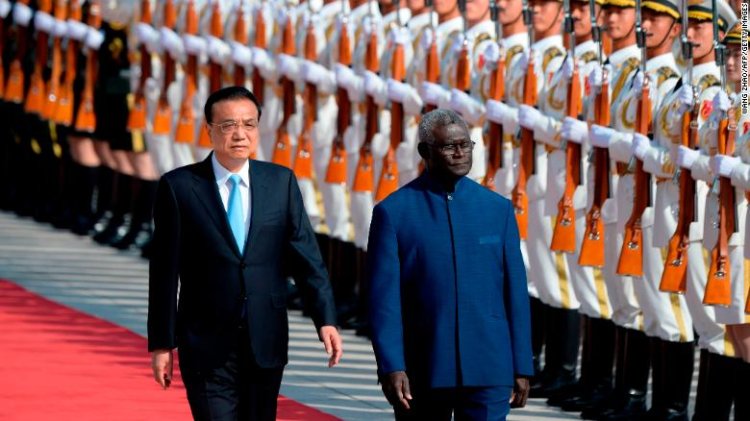The leader of the Solomon Islands defends a proposed security pact with China, calling the criticism "extremely offensive."
The Prime Minister's Office said in a statement Friday that the government is "working to sign off and implement several development frameworks with China to further create a secure and safe environment for local and foreign investments."

The Solomon Islands' Prime Minister defended the country's potential security pact with China on Tuesday, slamming critics and calling their demonstrations "extremely offensive."
Last Monday, the Pacific Island nation acknowledged it would deepen its security relationship with China, alarming regional governments concerned about Beijing's expanding reach.
"We find it quite disrespectful to be called unfit to conduct our sovereign issues," Prime Minister Manasseh Sogavare said in Parliament on Tuesday, responding to the international outcry. "We don't approach security in a vacuum, and we don't do it without taking into account all of our partners."
"The Solomon Islands requested the Security Treaty, and we have not been coerced... in any manner by our new partners," he added. "We have no intention of getting involved in any global power struggle, Mr. Speaker."
He also chastised Australian media for reporting that Beijing is seeking to create a military post in the Solomon Islands, which would be a first for China in the Pacific region, which Canberra regards as its backyard.
The Prime Minister's Office said in a statement Friday that the government is "working to sign off and implement several development frameworks with China to further create a secure and safe environment for local and foreign investments."
"In advancing towards our security needs, we need to diversify," Sogavare told Parliament on Tuesday. "We are a country with limited security capabilities, and we will always need support."
However, several countries, including the United States and Australia, have expressed alarm about the proposed agreement, as they have grown increasingly concerned about an assertive China's rising influence in the region.
Australia has had a considerable influence in the Pacific Islands for decades as a wealthy contributor aiding aid-dependent nations. However, China has recently emerged as a key player in the region, investing billions of dollars and turning these tiny islands into a hotbed of power struggles.
As China's naval capabilities and military islands in the South China Sea have grown, tensions have only intensified.
Australia and the Solomon Islands have had a security agreement in place since 2018, allowing Australian police, defense, and civilian employees to deploy quickly to the islands in the case of a security threat.
In a statement released Friday, the Solomon Islands government stated that it will "continue to safeguard its Security Agreement with Australia as it expands and deepens its connections with other partners, including China."
Defense Minister Peter Dutton expressed concern on Friday that any security agreement with Beijing could lead to China growing its military presence in the region, a position that Australian Prime Minister Scott Morrison reaffirmed on Monday.
Morrison told reporters that the arrangement is "a source of anxiety for the region," but that it was not unexpected. "We've known about these pressures for a long time," he said, adding that the recent development was "a reminder of the continual strain and risks that exist in our neighborhood to our national security."
In a statement released Tuesday, New Zealand expressed "strong condemnation," adding that the potential partnership "risks destabilizing the current institutions and arrangements that have long ensured the Pacific region's security."
Following civil upheaval in the Pacific island nation last year, it also announced the continuation of New Zealand Defence Force (NZDF) and police deployments to the Solomon Islands.
The Solomon Islands just recently established diplomatic relations with Beijing, with the government 2019 recognizing mainland China over Taiwan, a decision that has sparked public outrage.
That was one of the issues that arose during violent protests in Honiara, the capital, last November when Australia dispatched police and military men to assist local authorities.
Sogavare said both New Zealand and Australia are significant bilateral partners during his Tuesday remarks, adding that he had written a letter and sent text messages to Morrison on the subject.
Wang Wenbin, a spokesperson for China's Foreign Ministry, did not directly reply to a query about the planned security pact on Friday, but did say that the two countries "perform normal law enforcement and security cooperation based on equality and mutual benefit."

 Boakyewaa Lawrencia
Boakyewaa Lawrencia 


































